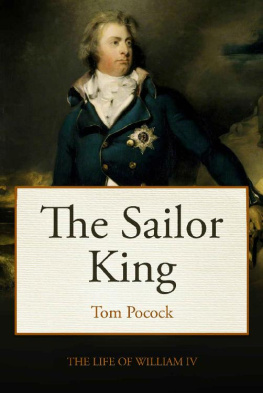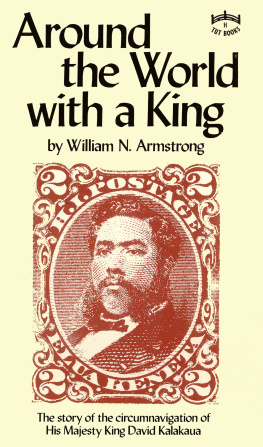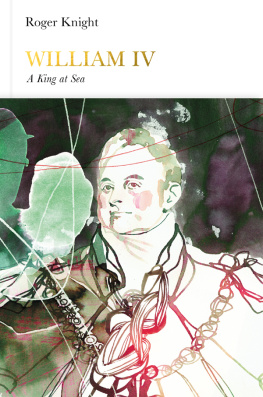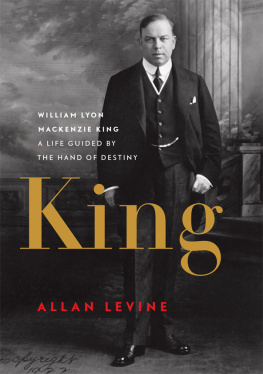SAILOR KING
The Life of
King William IV
Tom Pocock
First published by Sinclair-Stevenson Limited in 1991
Copyright Tom Pocock 1991
This edition published in 2020 by Lume Books
30 Great Guildford Street,
Borough, SE1 0HS
The right of Tom Pocock to be identified as the author of this work has been asserted by them in accordance with the Copyright, Design and Patents Act, 1988.
All rights reserved. No part of this publication may be reproduced, stored in a retrieval system, or transmitted in photocopying, recording or otherwise, without the prior permission of the copyright owner.
T o
E lizabeth and D avid W oodward
Table of Contents
Introduction
The names of Prince William Henry, the Duke of Clarence and King William IV as the subject of this book was successively known have never appeared in the pantheon of British naval heroes; except, perhaps, his own. He may have come to see himself as King Neptune but to his contemporaries he was, at best, a nautical John Bull.
He was also, of course, Sovereign of the United Kingdom and Northern Ireland, Defender of the Faith, and so on, for the seven years that separated the Georgian from the Victorian worlds. His reign, despite its brevity, was of the greatest importance and most of his few biographers have concentrated upon it. Yet its events and implications are of most interest to students of political history. If his life is taken at a more even pace, a fresh historical character emerges: often comic, sometimes pathetic, alternately contemptible and endearing, selfish and good-hearted; but always fascinating and ultimately significant.
This book takes his life, as he saw it himself, as that of a naval officer who happened to become King rather than of a king who happened to have been a naval officer. The career of what one contemporary saw as a thoroughbred seaman and another as a cranky old sailor shaped the character that had to preside over the great political and social upheavals in the Age of Reform.
He was always a man of contradictions, enthusiasms and appetites and these human traits proved as much a strength as a weakness. While his elder brother, King George IV, was the archetypal drawing-room dilettante and voluptuary of the period, William was the salty Jack-the-Lad. Yet it was William, not George, who exercised the greater influence on their successors to the throne.
King Williams youthful character was lively and enquiring but vulnerable and pliable, and it was shaped by strong influences, more often negative than positive. His royalty brought advantages but also the handicap of being seen as a superhuman being and coming to believe this himself. Despite that, and because of a few strong and positive influences, he survived flattery and ridicule to show, as King, what one of his biographers, Roger Fulford, described as a gleam of greatness.
He was the first king to be fully trained and tested by service in the Royal Navy. Other monarchs notably Alfred, Henry VIII, Elizabeth I, Charles I and Charles II and James II had shown intense interest in naval power as the first line of national defence, for the promotion and protection of trade and for expanding their domains. Two of King Williams uncles the Dukes of York and Cumberland had been sent to sea as naval officers but been promoted on grounds of their royalty alone and at such absurd speed that their brief appearances on quarterdecks damaged the reputations of both the Royal Navy and the monarchy.
It was King George III who recognised that the controlled environment of a warship could provide ideal training for a prince, and so decided that his third son should follow a full naval career for the foreseeable future. King William himself sent one of his illegitimate sons into the Navy and his successor, Queen Victoria, decided on a naval career for her second son, Prince Alfred, the first Duke of Edinburgh, who eventually commanded the Mediterranean Fleet.
The only monarch, other than King William IV, to be called a Sailor King was George V, upon whom the experience had a lifelong effect, not least in giving him as near-mystical an attitude to the Navy as to the monarchy itself. As a boy brought up in his reign, I recall regarding the Royal Navy, the Church of England, the British Empire and the monarchy as the four pillars of civilisation. I also remember that my father, who had taught English and history to cadets at the Royal Naval College, Dartmouth, saw the Navy as far more than an armed force, unlike the Army, which he considered wholly concerned with killing and parades.
King George V sent three of his five sons the Prince of Wales and the Dukes of York and Kent into the Navy. For the first and last of these it was not a success, neither being temperamentally suited. The Prince of Wales suffered from bullying at first and later had more pressing calls on his time than watch-keeping. The Duke of Kent was charming and popular but ineffective; my father recalled the choruses of, Ooh, George ! from the touchline at football matches when he missed the ball yet again; later he was remembered for the strength of his eau-de-cologne and was reputed to have had a toe amputated on each foot so as to be able to wear more pointed shoes. The naval careers of both were cut short, the latters for health reasons, but their promotion through the higher ranks continued.
It was the future Duke of York who benefited most. As a young officer, he was present at the Battle of Jutland in 1916 and the experience of action gave the hitherto timid youth the self-confidence he was to need when he unexpectedly came to the throne as King George VI. His grandson, the present Prince of Wales, an intelligent, sensitive young man, may have become more confident in the Royal Navy in which he eventually commanded a minesweeper. His younger brother, Prince Andrew, became a naval officer, took part in the Falklands campaign of 1982 as a helicopter pilot and continued his career when Duke of York.
Among other members of the royal family and their relations, the Battenbergs (who changed their name to Mountbatten) were preeminent. Prince Louis, a grandson-in-law of Queen Victoria, became First Sea Lord, and two of his sons, George and Louis, became naval officers. As Marquis of Milford Haven, the former showed promise before his untimely death, and the latter achieved the greatest fame of any as Admiral of the Fleet Earl Mountbatten. Following his father as First Sea Lord, he had served as Chief of the Defence Staff before his assassination by Irish terrorists.
Both first and second Dukes of Edinburgh, living a century apart, became notable naval officers remembered by their contemporaries as efficient but, respectively, as taciturn and abrasive. The latters period of service covered the transition of the nation from being the keystone of a global empire with a Navy that was the final arbiter of international dispute to a second-rank power poised uneasily between Europe and English-speaking North America.
The life and times of King William inevitably suggest parallels with the attitudes and behaviour of his successors. One of the more obvious is that of the ecstatic welcome he was accorded on returning from his first experience of battle and that of Prince Andrew, two centuries later, on his homecoming from the Falklands.
Indeed, our own times throw back many echoes of his. So perhaps his story can usefully be read as a parable.
Tom Pocock
Chelsea, 1991.
Prologue
At three minutes to six on the morning of Saturday, 2 May 1778, just as London was beginning to stir, a carriage, attended by mounted grooms, jingled through the gates of the Queens House, the palace at the western end of The Mall. In the clear morning light, not yet clouded by the smoke of the cooking-fires of the capital, its two pairs of horses paced briskly beneath the fresh leaves of the trees in St Jamess Park and crossed the Thames by Westminster Bridge before taking the road across Surrey and into Hampshire. Its passengers were the King and Queen of England.
Next page











